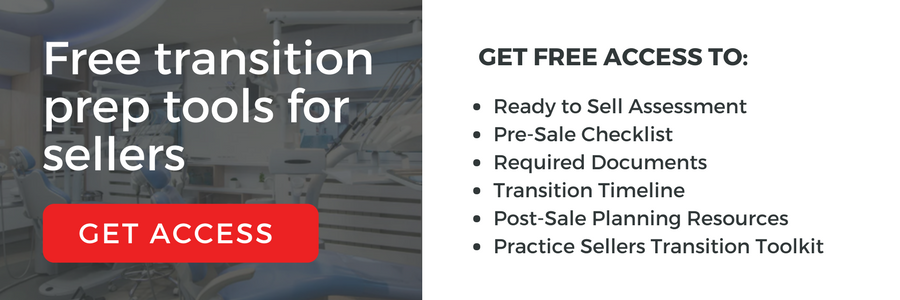Selling your practice is no small decision. You’ve had it in the back of your mind for a while, and now it’s finally starting to become a reality. You might be worried because you want to make sure your patient’s are in the right hands or maybe your practice isn’t as cutting-edge and efficient as it once was. There are many tough questions you face when selling, but the good news is, it’s a sellers market, with many buyers and not enough sellers.
We work with many sellers and buyers at JPA transitions, and we know that there are piles of information to process and what may feel like, hundreds of documents to go through and prepare. That’s why it’s important to work with your professional team and let them support you, so you can have the right questions answered and have a successful practice transition.
Here are some of the questions our sellers are faced with and how to handle them.
How to Answer the Tough Questions
1. Why am I selling my practice?
Know the reason why you are selling. There isn’t a right or wrong answer, but you should have clarity around selling, especially if you are a younger than average seller. Maybe you want to slow down your lifestyle, work part-time, travel, change careers, retire or specialize. This is all fine. At the end of the day, your buyers will care about the numbers. We suggest having a clarity around the “why” to show buyers that there is a significant reason why you are selling, which will help lead to a successful transition and establish a healthy rapport with your buyer moving forward.
2. Will I have enough money for retirement?
Ensure that you have a retirement plan in place to prepare for your future. There are many variables to consider when selling your practice which include but are not limited to; down payments, tax consequences, possible earn-outs and possible seller carry back notes. By planning for these things upfront, you can better prepare for lifestyle changes. Remember, your retirement should not hinge on your practice sale financially.
PRO TIP: Make sure to work with your professional team of lawyers, accountants, financial advisors, and a dental transition team to help you handle the sale.
Related Blog: How Long Will it Take Me to Sell My Dental Practice?
3. Should I sell a practice I just started?
A young-life practice sale, for whatever the reason, can be a challenge to evaluate on the financial front, and may be viewed more along the lines of a start-up opportunity. Working with a dental broker will help you examine the opportunity through a practice appraisal. This sort of practice requires a little more work for your buyer in the form of financing options. On the bright side, you have new equipment (or lightly used), it’s probably up-to-date and gives the buyer the ability to turn the practice into exactly what he or she envisions.
4. What do my practice numbers say?
Remember, properly accounted numbers don’t lie. After receiving your practice appraisal and examining the data of your practice, a lot of things can be said. The healthier the practice, the larger the return when you choose to sell, or seek a loan for upgrades to your growing practice. Essentially, the more revenue your practice generates per month, the better chance of a strong cashflow which will translate to a higher value. Make sure you figure out the selling conditions so you can set your buyer’s expectations and know what you’re negotiating towards early on in the process.
5. My buyer just asked for financial documents, which ones should I give them?
Gathering pertinent financial reports is important to have on hand for when your buyer asks. Typically the distribution of these documents will all be handled by your broker. The broker will know what information can be provided outside of a NDA (non-disclosure agreement) and what information requires one.
So, whether you are gathering the information for your broker, or other, here are some of the documents that will be needed: You should have 3 years of business tax returns, 3 years of Profit and Loss statements, production reports, fee schedules, etc. If you don’t have it quite ready yet, follow common business conduct. We recommend that you already have this information gathered, but if you’re unsure of where the information is, tell them you are gathering the information and will give them their documents in X business days. Remember to always add a timeline so that it holds you accountable, and make sure to deliver on it. A firm timeline is good for all deals.
Related Blogs:
Selling Your Dental Practice? Let's Talk Debt Payoff
For Sale By Owner? Tips for Selling Your Dental Practice
6. My buyer wants to meet the staff, what should I say?
There’s too much at jeopardy here. We understand that the buyer may want to meet the staff, but it is common place for this not to happen until after the deal is done, or at least all the contracts are executed. Therefore we highly suggest that you do not agree to introduce the buyer to the team until the deal is concrete. Why? If the practice sale were to leak out to key staff and patients it could result in fear and uncertainty in the staff and patient base. Fear of the unknown is a great motivator, and we do not want staff or patients taking the situation into their own hands and finding a new employer or provider. Maintaining confidentiality is one of the most important practices when selling or buying a practice. Instead, tell the buyer that you would be glad to give a synopsis of each employee and the team in general, and lay out a timeline for when they can expect to meet the staff.
Prepare for selling a dental practice
Remember, a professional team has your best interest in mind and can make sure you can answer all of these questions with the utmost confidence. These questions are common in due diligence, one of the most important steps in the process of buying or selling a practice. At JPA, we’ve worked with many sellers and buyers in our careers. If you’re looking at transitioning out of ownership and want to know the steps you need to take, feel free to reach out to anyone on our team.

 980.283.7355
980.283.7355
















Comment